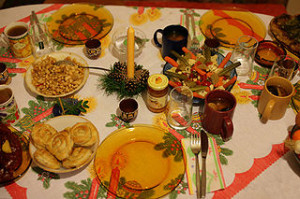
Wikimedia Commons: Elena Chochkova
For most Americans, the major holiday season of the year falls between Thanksgiving and Christmas, despite retailers who begin pushing high-level consumerism shortly after Labor Day. This year, even Hanukkah is early. As many know, the first day of Hanukkah falls on Thanksgiving, a very rare occurrence, indeed. According to the Thanksgivukkuh Wikipedia page, Hanukkah and Thanksgiving last overlapped in 1888, and it’s not scheduled to happen again until the year 79,811. And, yes, Thanksgivukkuh has its own Wikipedia page, its own Facebook page (with well over 10,000 Likes) and its own Twitter hashtag.
For most Christians, this year’s Thanksgiving weekend also coincides with the start of Advent which begins on December 1st. Advent is a time of hopeful expectation as Christians await the birth of Jesus, celebrated on Christmas Day. Many churches display an Advent wreath containing 4 or 5 candles. One candle is lit for each of the four Sundays in the season. The 5th candle can be lit on Christmas Eve or Christmas Day. Advent calendars can also be used to mark the days from Dec. 1 to Christmas morning. Many Advent calendars have 24 little windows, so one window can be opened each day. Both are excellent ways to mark the joyous period leading up to Jesus’ arrival into the world.
Unless, of course, you’re an Eastern Orthodox Christian. Then, the Advent season starts on November 15th and lasts for 40 days. While some Orthodox churches refer to the season as Advent, you’ll also hear it called Winter Lent or Nativity Fast. The overall tone of the season is similar to that of other Christians; however, Orthodox Christians are much more likely to mark this time period with fasting. Consumption of meat, dairy, fish, oil, and wine are all greatly curtailed or eliminated entirely, depending on the day. One Greek Orthodox Church in Alabama moved its annual Greek Fest to this upcoming weekend to avoid last weekend’s Alabama-LSU football game. That means the Greek Fest now coincides with the first weekend of the Nativity Fast. And yes, that means many of the people cooking and serving the festival food will not be eating it.
The celebration of Advent is only one difference between the Orthodox and non-Orthodox Christians. The Christian Church officially separated into the Eastern and Western branches in 1054. The Eastern branch became the Eastern Orthodox Church; the Western branch became the Roman Catholic Church. Every history book covering the Middle Ages provides 1054 as the date of this Great Schism, even though theological differences between the two groups had existed for centuries. Honestly, it can be difficult for modern-day lay people to appreciate what all the fuss was about. There was the controversy about whether the Holy Spirit proceeds from the Father and the Son or just from the Father. There was the rivalry between Rome and Constantinople over which city was most important in the Church. And there was the issue of whether or not leavened or unleavened bread should be used for the sacrament of Holy Communion.
Of course, that was almost 1,000 years ago. Many differences have evolved over time, particularly with respect to religious practice, and those difference clearly show up at this time of the year. Thanksgiving, Hanukkah, the Advent season, and Christmas all involve food. And lots of it. Magazines, news programs, blogs and web sites offer tips on how to avoid gaining weight during the holiday season. I am invited to more parties between Thanksgiving and Christmas than the entire rest of the year combined, and there’s tons of food at all of them. It’s the only time of the year I can buy egg nog. It’s the only time of the year I feel completely justified in eating sugar cookies with both icing and sprinkles on top. And one of the burning questions rumbling around on the internet these days is what Jewish Americans will cook for Thanksgivukkah. Sweet potatoes or latkes? Brisket or turkey? The entire season is really an anti-fast. Until now, that has suited me just fine.
The truth is that I never fast. It’s not a particularly widespread practice in Protestant denominations, even at Lent. I even schedule my physician’s appointments in the morning because I don’t want to have to fast all day before they draw blood. But the more I study the world’s religions, the more I recognize the important role fasting can play in one’s spiritual life. The Orthodox Church is the second largest Christian Church in the world, with over 225 million adherents. Many of them will spend at least some of the next 40 days fasting. Muslims around the globe fast during the month of Ramadan. Members of the Baha’i community fast for 19 days in the spring. Both Orthodox and Non-Orthodox Christians, particularly Catholics, fast during Lent. And Buddhist monks and nuns often eat their last meal of the day at noon. In all cases, fasting periods are not simply about food – or not eating food. Fasting periods are also about sharing with others in need, avoiding selfish desires, steering clear of bad habits, and reconnecting with God.
Perhaps I should try it. With all the shopping, parties, feasts, merry-making, and socializing coming up, fasting might serve as a helpful reminder that most of the holidays at this time of the year are about the divine in one way or another.